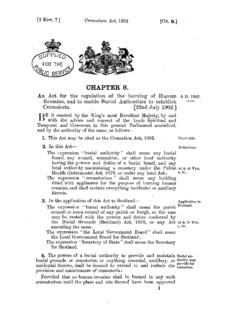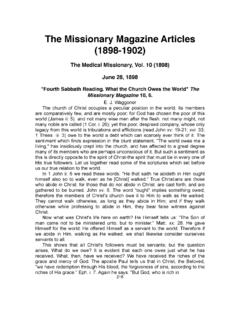Transcription of John Steinbeck (1902-68) - oe10.dk
1 MMLLDC 1 john Steinbeck (1902-68) john Steinbeck was a native of California, , and many of his stories concern the lives of those, originally from many different cultures, who settled there, often as farmers and ranchers. He is among the best-known American writers of this century and was awarded the Nobel Prize for Literature in 1962. His novels include `Tortilla Flat' (1935), `Of Mice and Men' (1937), `The Grapes of Wrath' (1939) and `East of Eden' (1952). `The Murder' comes from the collection of short stories `The Long Valley', originally published in 1938. The story `The Murder' is set in the early days of settlement in California. It is the story of a marriage between people of different nationalities, of the violent climax to the growing problem between them and of the surprising outcome.
2 The Murder This happened a number of years ago in Monterey County, in central California. The Ca on del Castillo is one of those valleys in the Santa Lucia range* which lie between its many spurs and ridges.* From the main Ca on del Castillo a number of little arroyos* cut back into the mountains, oak-wooded canyons,* heavily brushed with poison oak and sage. At the head of the canyon there stands a tremendous stone castle, buttressed* and towered like those strongholds the Crusaders* put up in the path of their conquests. Only a close visit to the castle shows it to be a strange accident of time and water and erosion working on soft, stratified sandstone.* In the distance the ruined battlements, the gates, the towers, even the arrow slits, require little imagination to make out.
3 Below the castle, on the nearly level floor of the canyon, stand the old ranch* house, a weathered and mossy barn and a warped* feeding-shed for cattle. The house is deserted; the doors, swinging on rusted hinges, squeal and bang on nights when the wind courses down from the castle. Not many people visit the house. Sometimes a crowd of boys tramp through the rooms, peering into empty closets and loudly defying* the ghosts they deny. Jim Moore, who owns the land, does not like to have people about the house. He rides up from his new house, farther down the valley, and chases the boys away. He has put `No Trespassing'* signs on his fences to keep curious and morbid* people out. Sometimes he thinks of burning the old house down, but then a strange and powerful relation with the swinging doors, the blind and desolate windows, forbids* the destruction.
4 If he should burn the house he would destroy a great and important piece of his life. He knows that when he goes to town with his plump* and still pretty wife, people turn and look at his retreating back with awe* and some admiration. MMLLDC 2 Jim Moore was born in the old house and grew up in it. He knew every grained and weathered board of the barn, every smooth, worn manger-rack.* His mother and father were both dead when he was thirty. He celebrated his majority* by raising a beard. He sold the pigs and decided never to have any more. At last he bought a fine Guernsey bull to improve his stock, and he began to go to Monterey on Saturday nights, to get drunk and to talk with the noisy girls of the Three Star. Within a year Jim Moore married Jelka Sepic, a Jugo-Slav girl, daughter of a heavy and patient farmer of Pine Canyon.
5 Jim was not proud of her foreign family, of her many brothers and sisters and cousins, but he delighted in her beauty. Jelka had eyes as large and questioning as a doe's* eyes. Her nose was thin and sharply faceted, and her lips were deep and soft. Jelka's skin always startled* Jim, for between night and night he forgot how beautiful it was. She was so smooth and quiet and gentle, such a good housekeeper, that Jim often thought with disgust of her father's advice on the wedding day. The old man, bleary and bloated* with festival beer, elbowed Jim in the ribs and grinned suggestively,* so that his little dark eyes almost disappeared behind puffed and wrinkled lids. `Don't be big fool, now,' he said. `Jelka is Slav girl. He's* not like American girl. If he is bad, beat him.
6 If he's good too long, beat him too. I beat his mama. Papa beat my mama. Slav girl! lie's not like a man* that don't beat hell out of him.' `I wouldn't beat Jelka,' Jim said. The father giggled and nudged him again with his elbow, `Don't be big fool,' he warned. Sometime you see.' He rolled back to the beer barrel. Jim found soon enough that Jelka was not like American girls. She was very quiet. She never spoke first, but only answered his questions, and then with soft short replies. She learned her husband as she learned passages of Scripture.* After they had been married a while, Jim never wanted for any habitual thing* in the house but Jelka had it ready for him before he could ask. She was a fine wife, but there was no companionship in her. She never talked.
7 1 Ier great eyes followed him, and when he smiled, sometimes she smiled too, a distant and covered* smile. Her knitting and mending and sewing were interminable.* There she sat, watching her wise hands, and she seemed to regard with wonder and pride the little white hands that could do such nice and useful things. She was so much like an animal that sometimes Jim patted her head and neck under the same impulse that made him stroke a horse. In the house Jelka was remarkable. No matter what time Jim carne in from the hot dry range* or from the bottom farm land, his dinner was exactly, steaming ready for him. She watched while he ate, and pushed the dishes close when he needed them, and filled his cup when it was empty. Early in the marriage he told her things that happened on the farm, but she smiled at him as a foreigner does who wishes to be agreeable even though he doesn't understand.
8 `The stallion cut himself on the barbed wire,' he said. And she replied `Yes,' with a downward inflection that had neither question nor interest. He realized before long that he could not get in touch* with her in any way. lf she had a life apart,* it was so remote as to be beyond his reach. The barrier in her eyes was not one that could be removed, for it was neither hostile nor intentional. MMLLDC 3 At night he stroked her straight black hair and her unbelievably smooth golden shoulders, and she whimpered* a little with pleasure. Only in the climax of his embrace did she seem to have a life apart, fierce and passionate. And then immediately she lapsed into* the alert and painfully dutiful wife. `Why don't you ever talk to me?
9 ' he demanded. `Don't you want to talk to me?' `Yes,' she said. `What do you want me to say?' She spoke the language of his race out of a mind that was foreign to his race. When a year had passed, Jim began to crave* the company of women, the chattery exchange of small talk, the shrill pleasant insults, the shame-sharpened vulgarity.* He began to go again to town, to drink and to play with the noisy girls of the Three Star. They liked him there for his firm, controlled face and for his readiness to laugh. `Where's your wife?' they demanded. `Home in the barn,' he responded. It was a never-failing joke. Saturday afternoons he saddled a horse and put a rifle in the scabbard in case he should see a deer. Always he asked: `You don't mind staying alone?' `No 1 don't mind.' At once he asked: `Suppose someone should come?
10 ' Her eyes sharpened for a moment, and then she smiled. `1 would send them away,' she said. `VII be back about noon tomorrow. it s too far to ride in the night.' He felt that she knew where he was going, but she never protested nor gave any sign of disapproval. `You should have a baby,' he said. Her face lighted up. Some time God will be good,' she said eagerly. He was sorry for her loneliness. if only she visited with the other women of the canyon she would be less lonely, but she had no gift for visiting. Once every month or so she put horses to the buckboard* and went to spend an afternoon with her mother, and with the brood of brothers and sisters and cousins who lived in her father's house. `A fine time you'll have,' Jim said to her. `You'll gabble your crazy language like ducks for a whole afternoon.





